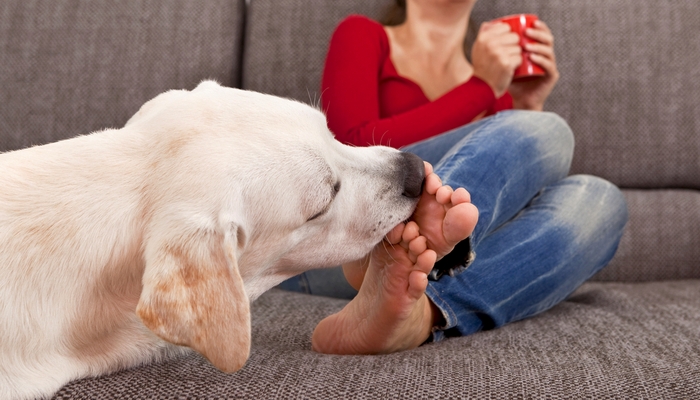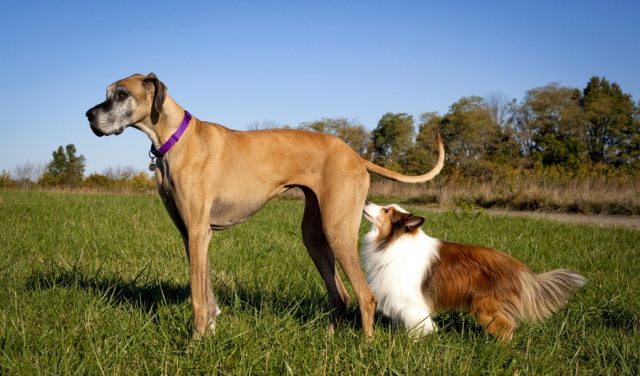
Table of Contents
- Answering 13 “Why Does My Dog” Questions
- 1. Why Does My Dog Lick My Feet?
- 2. Why Does My Dog Growl at Me for No Reason?
- 3. Why Does My Dog Sleep So Much?
- 4. Why Do Dogs Eat Their Own Vomit?
- 5. Why Does My Dog Keep Licking the Air?
- 6. Why Does My Dog Eat Sticks?
- 7. Why Do Small Dogs Shake?
- 8. Why Do Dogs Lick Each Other?
- 9. Why Does My Dog Lick My Arm?
- 10. Why Does My Dog Hump My Leg?
- 11. Why Does My Female Dog Hump My Male Dog?
- 12. Why Does My Dog Lick His Paws So Much?
- 13. Why Do Dogs Bark at Strangers?
Dogs do strange things, and we've all asked ourselves, “Why does my dog do that?” Most of these questions have no answers, but some strange quirks are actually commonly seen in dogs. We've rounded up the top 13 canine conundrums and found the answers you've been looking for.
 Keep in mind that dogs with weird habits have usually had those habits their entire lives. If your pup begins exhibiting strange behavior out of the blue, it's best to seek the advice of your veterinarian. But there are plenty of things our dogs do that leave pet owners puzzled because we often associate their behavior and consider it from our personal point of view and human-like experience.
Keep in mind that dogs with weird habits have usually had those habits their entire lives. If your pup begins exhibiting strange behavior out of the blue, it's best to seek the advice of your veterinarian. But there are plenty of things our dogs do that leave pet owners puzzled because we often associate their behavior and consider it from our personal point of view and human-like experience.
The important part is to recognize these signs and know which ones are best left alone and which ones you really need to pay attention to. You may not realize that many “quirks” of your Fido can actually be signs of an underlying health issue. Licking, snorting, excessive sleeping, and other seemingly harmless behaviors can actually be symptoms of very serious diseases and medical conditions.
ALSO READ: 30 Myths That Many Dog Owners Still Believe
Answering 13 “Why Does My Dog” Questions
1. Why Does My Dog Lick My Feet?
Dogs may lick your feet for a number of reasons, the first being salt and acidity. When your dog licks the sweat on your feet, he tastes the acidity and salt, a flavor and taste sensation that he finds pleasurable.
The second reason that your dog may lick your feet is the scent. One way that our dogs experience enhanced scent is through taste, just like we do! So it could be that your dog is just getting a good idea of what your feet smell like by licking them!
Lastly, it could be that he may be licking your feet because he finds the process of licking them to be soothing. Behaviorists believe that the very act of licking releases endorphins in a dog, creating a calming and pleasurable sensation. So licking your feet could quite literally be the equivalent of a “runner’s high” for your dog!
READ MORE: Why Does My Dog Lick All the Time?
2. Why Does My Dog Growl at Me for No Reason?
Dogs never growl for no reason, so if your dog is growling at you, there is a reason behind it. The overwhelming reason for most dogs growling at their owners is aggression. This aggression can be the result of a previous owner’s mistreatment, a lack of proper handling and socialization, or learned aggression.
Occasionally, this aggression may also be biological in nature. In these instances, growling may be caused by genetic conditions or poor health.
If faced with unexplained growling in your dog, consult your veterinarian immediately. If your pet is cleared by his veterinarian for possible causes of aggression, consult a behaviorist who specializes in canine aggression. It is crucial to address any sign of aggression in your dog immediately.
3. Why Does My Dog Sleep So Much?
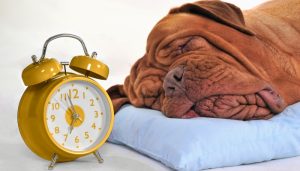 The average adult dog sleeps between 12 and 14 hours a day, according to research. The average puppy sleeps between 18 and 19 hours a day. The average senior dog sleeps between 16 and 18 hours a day.
The average adult dog sleeps between 12 and 14 hours a day, according to research. The average puppy sleeps between 18 and 19 hours a day. The average senior dog sleeps between 16 and 18 hours a day.
If your dog is sleeping more than this average, consider how much exercise he is getting and how vigorous that exercise is. Just like us, our dogs need time to recover following rigorous exercise, so this will increase their need to sleep. Your pet's sleeping schedule (and your dog's sleep positions) can tell you a lot about your pup's health.
If Fido is sleeping more than average and is relatively inactive, it may be time to consult your veterinarian. It is possible that your dog just needs more sleep than most, but there are some health conditions, like anemia, infection, heart disease, and diabetes, that can cause lethargy and sleepiness.
TRY: 5 Best Dog Blankets for Sleeping
4. Why Do Dogs Eat Their Own Vomit?
Many dogs eat their own vomit, and there are a few theories as to why. Primarily, when a dog eats too quickly or tries to eat larger pieces of food than can comfortably pass down the esophagus, he will throw up.
When this happens, the food that has been thrown up is not much different than the food that your dog ate the first time since it has not been digested. In this case, the dog will re-consume the food simply because it’s food!
In other incidences, when a dog vomits, he eats the vomit to clean up the mess that has been made. Many dog owners think that this is due to “embarrassment” or fear that they will be in “trouble” for throwing up on the carpet. This is actually a behavior that stems from instinct.
When living in a den, wild dog mothers will keep the living space clean by eating any mess inside it – yes, this includes waste from puppies! So, if a dog vomits in a small living space, they may eat that vomit simply to keep their space clean.
Lastly, a dog may eat vomit because it resembles the regurgitated food that they consumed as pups. As puppies wean from their mothers, they are often introduced to “solid foods” through regurgitation. The mother dog will regurgitate partially digested food to feed the pups, and the pups will consume it. Vomit isn’t much different from this regurgitated food, and to dogs, it’s simply edible sustenance!
5. Why Does My Dog Keep Licking the Air?
Dogs do not only smell with their noses; they also smell with their mouths! According to studies, the dog’s olfactory system includes something called Jacobson’s Organ, which plays a role in detecting and deciphering certain molecules in the air. When dogs lick the air, they may be washing scent molecules back to Jacobson’s organ so that they have a better understanding of their environment.
Dogs also lick the air as a compulsive behavior when nervous or excessively stressed, when they have dental pain or discomfort, prior to vomiting, before seizure activity, and when suffering from canine dementia. If a dog exhibits constant air-licking behavior or shows other signs of poor health in addition to air-licking, it is important to get a health evaluation as soon as possible.
6. Why Does My Dog Eat Sticks?
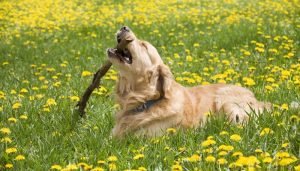 Dogs may eat sticks for a couple of different reasons. Firstly, chewing is a natural instinct for dogs. If sticks are available, then it is likely that they will become the target of chewing simply because they meet the natural desire to chew.
Dogs may eat sticks for a couple of different reasons. Firstly, chewing is a natural instinct for dogs. If sticks are available, then it is likely that they will become the target of chewing simply because they meet the natural desire to chew.
Secondly, dogs also chew out of anxiety and nervousness. This is more of a destructive behavior that provides an outlet for nervous energy and can even soothe the dog by redirecting his anxiety.
Thirdly, a dog may eat sticks because he is malnourished and has nothing else to eat. Now, it is unlikely that this is the case for your dog, but if he has been malnourished in the past, he may still replicate stick-eating behavior.
Lastly, just like people, dogs can suffer from pica – a medical issue in which they eat or crave items that are not food. If your dog eats sticks, he should be prevented from doing so in the future to avoid splinters, intestinal perforations, illness, etc. You should also have him evaluated by a vet for underlying causes of the behavior.
7. Why Do Small Dogs Shake?
Shaking or trembling is a behavior most commonly seen in small dogs like Chihuahua’s. Most often, the cause for this trembling is coldness. Small dogs, particularly those with thin, short coats, are very susceptible to chilling in cooler weather. This can be prevented by using dog clothing to keep the dog warm in cooler temperatures.
Another common cause of shaking in small dogs is fear or anxiety. Smaller dogs have a tendency to feel fearful as a result of constantly being picked up or babied by their owners. This can be avoided by treating a small dog just like any other dog and not carrying them everywhere.
Shivering or trembling is also the result of excitement. This is not limited to smaller dogs; large dogs can also tremble with excitement, and their teeth may even chatter. Lastly, shivering can be symptomatic of illness such as distemper. This is very unlikely, though, if a dog is kept up to date on vaccinations and annual veterinary exams.
SEE ALSO: 5 Best Coats for Dogs in Winter Cold and Autumn's Rain
8. Why Do Dogs Lick Each Other?
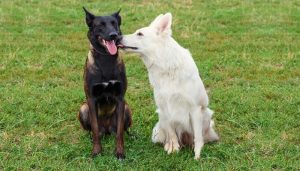 Dogs lick each other for many different reasons. You may be able to tell why a dog is licking another from the circumstances surrounding their meeting.
Dogs lick each other for many different reasons. You may be able to tell why a dog is licking another from the circumstances surrounding their meeting.
Some of the most common reasons that dogs lick each other include:
- Submission – Dogs will lick each other as a sign of submission; this is usually accompanied by a submissive or crouching posture.
- Hunger – It is not uncommon for puppies to lick an older dog’s mouth as a prompt to be fed. Young puppies prompt the mother dog to regurgitate food for them by specifically licking her mouth. For a short period after weaning, this behavior may still be seen.
- Greetings – Some dogs will lick other dog’s faces as a greeting. This is often used as a way for your dog to convey a message of a “peaceful hello.”
- Medical care – Anything from an open wound to a tumor that can’t be seen with the naked eye can prompt a dog to lick another dog. This can be seen as a sign of concern or as a desire to assist a friend in need.
- Dental trouble – A dog that licks inside another dog’s mouth may be indicating dental difficulties. It could easily be that a piece of food is hidden away in there, but if a dog continually licks inside the mouth of another, it’s time to check for dental disease, infection, or other signs of illness.
- Grooming – Dogs often lick each other’s ears as a means of grooming each other. This is usually a behavior that is seen only between two dogs that trust each other, however.
- Ear infections – Dogs with long or pendulous ears often experience yeast infections inside their ears. This yeast emits a sweet odor that can attract another dog and cause licking behavior. This should obviously be discouraged, and infected ears should be treated immediately to avoid eardrum perforation.
- Pheromone attraction – Researchers have found that the skin around an adult dog’s ears may emit pheromones that make them attractive to younger dogs. The reason for this, if true, is likely to encourage social behavior among packs and communication between individuals.
RECOMMENDED: How To Clean Dog's Ears – A Step-By-Step Guide
9. Why Does My Dog Lick My Arm?
There are multiple reasons why your dog may be licking your arm, the first being affection. There are only so many ways that a dog can display his affection, and licking is one of them.
Another reason that your dog may be licking your arm is sweat, similar to the reasons listed above that he may want to lick your feet. The salt and acid taste of sweat can provide your dog with a pleasurable sensation that he will seek out when possible.
Your dog may also be licking your arm because it comforts him. Licking can be a sign of a stressed or anxious dog who is trying to find comfort through repetitive behavior. Lastly is the obvious answer: it could be that you have spilled something on your arm that is attracting your dog. Even the smallest drop of barbecue sauce can’t escape your pup’s powerful nose!
10. Why Does My Dog Hump My Leg?
Dogs “hump” for a number of reasons, but when Fido humps your leg, it is most often the result of a playful gesture and has nothing to do with sex. Dogs will often mount each other as a playful sign, almost like a game of leapfrog without the actual leaping.
This should not be confused with the more aggressive hump that characterizes a desire for dominance.
Dogs use humping behavior to exert power or dominance over each other, but this is less seen in owner-dog relationships unless the owner has no control over their dog. Dogs can also hump out of excitement. When a dog gets carried away and overwhelmed with exciting feelings, he may mount or even masturbate as a way to release that emotion.
Lastly, humping may simply be that – a sexual behavior. It may be that your dog is seeking a sexual release, even if he is spayed or neutered. Fortunately, dogs usually exhibit this behavior with toys or their bed rather than their human legs.
11. Why Does My Female Dog Hump My Male Dog?
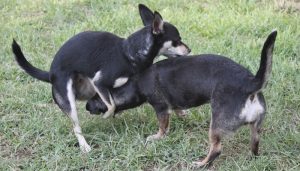 Dogs hump for four main reasons – sexual urges, establishing dominance, playing, or an attempt to release their overwhelming emotional feelings over a specific situation.
Dogs hump for four main reasons – sexual urges, establishing dominance, playing, or an attempt to release their overwhelming emotional feelings over a specific situation.
When a female dog mounts and humps a male dog, however, the reason is almost always a result of needing to establish dominance or an act of play.
12. Why Does My Dog Lick His Paws So Much?
The average dog will lick his paws to groom himself, but he will not do this obsessively. A dog that excessively licks his paws is facing a veterinary concern that needs to be addressed. If left unaddressed, the licking can easily cause sores, bleeding, dry and irritated skin, redness, baldness, and lameness.
Common causes for obsessive paw licking include:
- Allergies – Either environmental or food allergies can cause itching, redness, dry skin, hair loss, irritation, and excessive licking. This can only be treated through a process of elimination or allergy testing to determine the cause.
- Bacteria or Yeast – Bacterial or yeast infections of the paws can cause extreme redness and itching, which cause the dog to bite and chew his paws as well as lick them obsessively. Treatment includes the application of topical cream as well as oral steroids, antifungals, or antibiotics.
- Irritation – Stepping on a thorn, getting a splinter, burning paws on hot asphalt, etc… can all cause irritation to the paws and cause a dog to lick them in an effort to soothe his pain. Treatment includes identifying the culprit and treating its effects immediately.
- Compulsion – Dogs that experience nervousness and anxiety find repetitive actions, like licking or chewing paws, to be comforting. This should be discouraged by providing a distraction for the dog as well as considering anxiety aids.
- Other Health Concerns – Some dogs have been known to lick their paws repetitively when suffering from cancer in that affected limb. Not all dogs will do this, but when other possible causes have been ruled out, an X-ray of the affected limb may be helpful.
13. Why Do Dogs Bark at Strangers?
Dogs bark as a means of communication, and just like people, the environment and situation the dog is in have a lot to do with what he is saying. If a stranger is approaching the dog’s home, walking in his yard, or opening the front door, the dog will bark to alert his owner of the stranger’s approach as well as to defend his territory against the stranger.
If a stranger is standing over a dog or approaching him quickly, the dog will bark at them to warn the stranger off. This is a different bark than the “get out of my space” bark mentioned previously. It is a more severe bark that tells the stranger “I have teeth, I am dangerous, back off”.
If a stranger is passing by a dog that is tied outdoors, has been mistreated, or is malnourished, barking may also be a way for the dog to get attention. This bark can quite literally be a way for the dog to say, “Hey! Pay attention to me!” or “Hey! I’m hungry!”
If a stranger is passing by a dog that is overly friendly, but that stranger does not stop to greet the dog, the dog may also bark then. This is more of an irritated bark, the dog’s way of saying, “Hey! Why didn’t you stop to play with me?” or “Hey! Look at me!”
READ NEXT: 14 Tips On How To Become the Best Pet Parent to Your Dog


